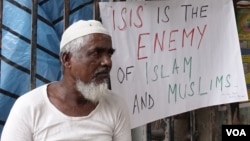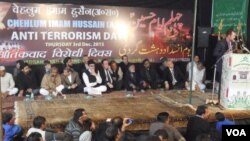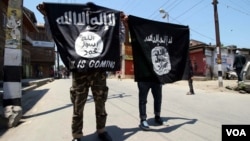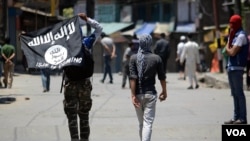Muslims across many cities in India have been holding rallies calling Islamic State (IS) “un-Islamic” and “an enemy of Islam,” following recent news reports that the terror group has threatened to spread its activities to India.
A recent manifesto purportedly released by IS said it “would now expand beyond Iraq and Syria…into… India, Pakistan, Bangladesh, Afghanistan (and several other countries),” The Indian Express reported.
Titled “Black Flags from the Islamic State,” the manifesto goads Indian Muslims to launch jihad against the government led by the “Hindu nationalist” Bharatiya Janata Party.
India’s junior home minister Haribhai Parthibhai Chaudhary said the government will take the recent IS threat seriously. Last month, India’s home ministry issued an advisory to all states warning of possible IS-backed terror attacks in the country.
At a rally in New Delhi Thursday, Muslims adopted a resolution pledging support to the government in its firm stand against IS. Muslims belonging to both Shi’ite and Sunni sects took part in the rally, which also was attended by diplomats from Syria, Iran, Iraq, Russia and Indian leaders from other religious communities.
“We, the Muslims in India, have marked the day (December 3) as Anti-Terrorism Day. In the presence of more than 350,000 people we took this resolution that we, the Muslims of this country, will keep fighting against Islamic State,” Bilal Hussain, a Shi’ite member of the convening committee of the rally told VOA.
In Kolkata Saturday, Muslims held another rally at which people condemned IS, shouting slogans and carrying placards, two of which read “ISIS Feasting on Muslim Blood” and “ISIS is the Enemy of Islam and Muslims.” ISIS is another acronym for the Islamic State.
No tolerance
Zafarul-Islam Khan, president of the All India Muslim Majlis-e-Mushawarat (AIMMM), a New Delhi-based umbrella body of Indian Muslim organizations, said IS has nothing to do with Islam.
“There is no question of any tolerance of such terrorist outfits in the Muslim community. They are claiming to be working in the name of Islam. But Islam does not approve of terrorism,” Khan told VOA.
According to an Indian Home Ministry report, after IS launched a fierce social media campaign for support, 23 Muslim youths in the past three years traveled out of India and joined IS in Iraq and Syria.
In the past two years, Muslim clerics and community leaders across the country have condemned the group, largely identifying it as a terrorist organization. In September, leading Indian Muslim religious leaders issued two fatwas - religious edicts - condemning IS’s activities as antithetical to the tenets of Islam.
In recent months, even in mosque sermons in India, Muslims have been advised to stay away from IS.
Aziz Mubarki, who attended the Kolkata rally, is among many Muslim leaders who believe IS cannot succeed in its attempt to spread its network in India.
“India is a vast country with as many as 200 million Muslims. Just around one in a million among them have joined the IS, if our home ministry's figure is really correct. It's clear that Indian Muslims did not respond to the calls of the Middle Eastern group at all," he told VOA.
The national secretary of South Asia Ullema Council, a body of Islamic clergies, added, “This is why our prime minister and home minister said that Indian Muslims do not support groups like al-Qaida and IS.”
IS not an ‘escalating threat’
Last year, in an interview with CNN, Indian Prime Minister Narendra Modi said al-Qaida will fail if it seeks to spread its terror network in India because it will not get any support from India’s Muslims who are ready to “die for India.” In March, Home Minister Rajnath Singh said India’s Muslims are “patriots” and so IS largely failed to influence them.
Security analyst Ajai Sahni, executive director of New Delhi-based Institute for Conflict Management, said he does not view IS as a threat to India in the current scenario.
“IS has made several statements regarding India since June 2014, including its inclusion in their projected map of world domination in the Khorasan region and the reference in their latest ‘manifesto.’ The impact has been negligible, as has been the impact of 19 years of al-Qaida overtures to Indian Muslims,” Sahni told VOA.
“There is need for vigilance, of course. The possibility of a ‘black swan event’ cannot be ignored. But there is no visible index to suggest an escalating threat (to India).”








